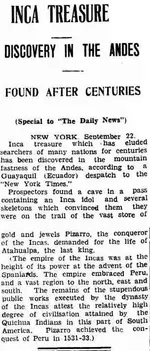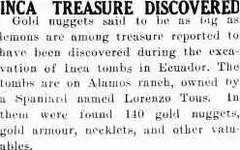Hello IPUK
I would not be too disappointed by not seeing the archival records in Lima. As you will discover there is very little there even with good Spanish. Most of the records from 1530 - 1800 are in Seville Spain. Much of the later Spanish period 1800 - 1825 has been lost due to mismanagement and many legal, contractual, documents have been sold off to private collectors. So has the later records from 1825-1880 was sold off or destroyed. Some universities bought some records otherwise records are all rather scattered.
My boss Hardluck has a massive collection several thousand of pages of various documents. In which he has been buying off other collectors over 30 years. He is considering returning this collection to the people of Peru and Bolivar and Ecuador when they are able to appreciate their own history, even their colonial one. To read each one, catalog and scan is long and expensive time consuming process.
Amy
Hello CI
The documents I needed to view were in relation to local records in Lima pertaining to the hiring of vessels and inventories of goods. It is a real shame that so much important stuff has been lost due to the various factors you mention. The Archivo General de Indias in Seville is indeed a really good stopping point, but one thing I discovered to my surprise when looking into the Llanganatis/Valverde/Atahualpa's Ransom, was that much was not actually sent back to Spain itself, but that letters were sent outlining requests and that the
original deroterros etc., were kept for 'safe-keeping' in the place of origin. Even though there was a bureaucratic process that was pretty efficient put in place by the Spanish, corruption, laziness, greed, indifference and cynicism were rife pretty much as they are today. The reason that the particular deroterro relating to the Valverde story was never discovered in Seville, was because it was
never sent there and was in the archives of Quito. It then went missing sometime in the early 19th century and was actually referred to in a book I tracked down detailing mining in Ecuador from a similar time period. Whatever was in those fabled mountains in Ecuador, was retrieved soon after. A European gentleman during the early part of the 20th Century managed to get lucky with a lake in those mountains which contained 'offerings' by the locals (from centuries gone by) consisting of gold and silver which did not really amount to much. He used that as a basis to try and mount an expedition to check
all the lakes and rivers in those mountains but died whilst on his way back to South America. The Ecuadorian government then did the checking and I'm not sure of the exact results, but they then decided to stock the lakes with fish after they had finished their surveys.
With a boss who can afford such philanthropic tendencies, don't you think he/she could also go by the nom de guerre of 'GoodLuck' rather than HardLuck?!

Surely they must have had a success or two to notch on to their records.....

Regards
IPUK
 ??
??  ??
?? 








 ), that is they set out to conquer their aims and objectives and appear to have met all of their goals. Good on them and it is nice to see a success story because in this business I would have thought there really isn't many of those. All too often it is "nearly" or "might". That they are enjoying the fruits of their labour and had the tenacity to go and get what they believed in, is more than enough for me to raise a glass or two in recognition and admiration. Some day I hope some of us can try and attempt to emulate their achievements.
), that is they set out to conquer their aims and objectives and appear to have met all of their goals. Good on them and it is nice to see a success story because in this business I would have thought there really isn't many of those. All too often it is "nearly" or "might". That they are enjoying the fruits of their labour and had the tenacity to go and get what they believed in, is more than enough for me to raise a glass or two in recognition and admiration. Some day I hope some of us can try and attempt to emulate their achievements.